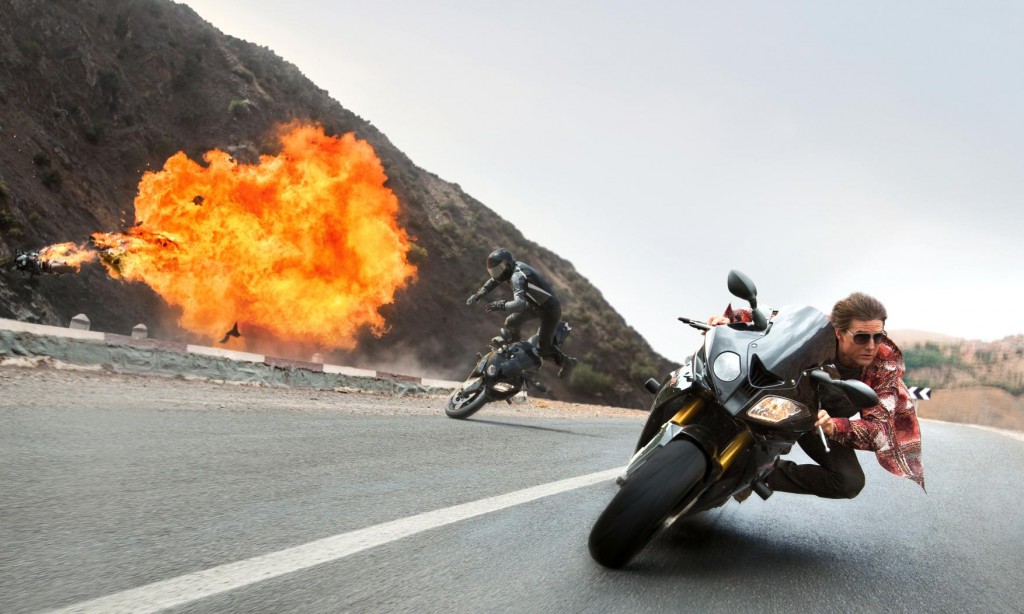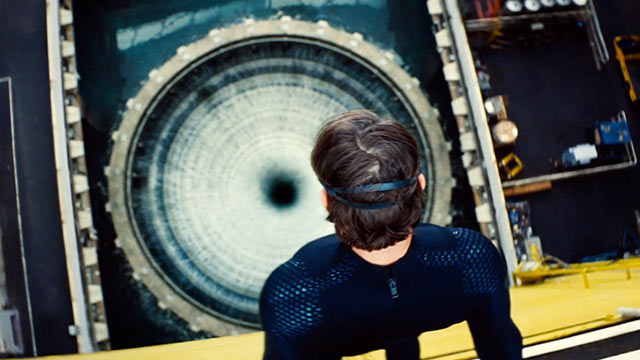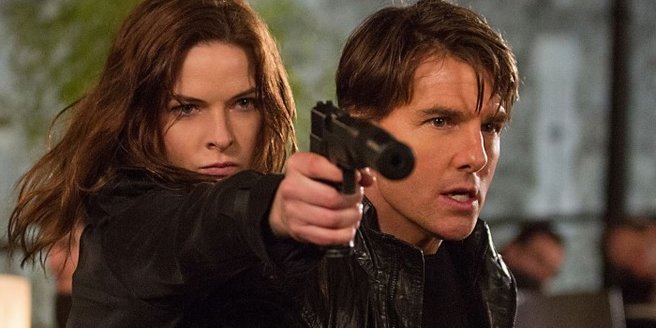In a piece I wrote last year with Dom, we talked about how the Mission: Impossible series is just about the closest thing America has to its own homegrown Bond franchise, an odd bunch of films that are unified by the fact that they’re just as much directorial showcases as they are vehicles powered by Tom Cruise’s star power. Brad Bird’s previous entry in the series, Ghost Protocol, is one of the best action movies of the last decade; Rogue Nation‘s helmer Christopher McQuarrie (Jack Reacher) had a tough act to follow. Luckily for him (and us), it’s a pretty excellent continuation of the series and a very solid flick in its own right.
In many ways, Rogue Nation feels very much like Skyfall, American Style. Even going beyond the similar plots—the US Government and bulldog CIA Director Alec Baldwin (Alec Baldwin) have grown tired of the destructive unaccountability of Ethan Hunt and the Impossible Missions Force, shutting them down as enigmatic terrorist organization The Syndicate embarks on an audacious campaign of global evildoing—but especially in the movie’s best sequence. As we watch Hunt and fellow agent Benji (Simon Pegg) attempt to foil a political assassination backstage at a performance at Vienna’s State Opera house, you can’t help but think of Skyfall‘s analogous Hong Kong sequence. This isn’t to say it’s derivative; as Skyfall was a uniquely Dark Knight flavor of James Bond, Rogue Nation feels in some respects like a return to the more artfully subdued spy style of Brian DePalma’s original film.
The Mission: Impossible series has been, and will always be, defined by crazy set pieces. McQuarrie, not to be outdone by Ghost Protocol, throws a series of balls-to-the-wall action Rubik’s Cubes at us that only increase in complexity. Hunt is on an ascending jet plane and Benji has to get him inside before it finishes takeoff? Sure. Hunt has to swim underwater to change out a computer disc so Benji can fool a security system and recover a hard drive from an underground bunker in Morocco? And he can’t use an oxygen tank? And there’s a big robot arm that threatens to smack the shit out of him? Rogue Nation gets that, at their best, Mission: Impossible‘s action set pieces should have you holding your breath and digging your nails into your arm rest.
Let’s talk about Tom Cruise! The man is 53 years old and, somewhat inexplicably, still the Fred Astaire of American Action. Something that’s really intrigued me about Cruise’s decade-plus Ethan Hunt performance is how the character has aged with him. Sometimes lost in his reputation as a capital-A Movie Star is the fact that Tom Cruise is a legitimately great actor, and his expressions, from a darting glance to a “eh what can you do” smirk to a bad guy, are a marvel. Cruise plays Hunt with a really rather beautiful weariness here. We’ve seen him try and fail to leave his life as a spymaster behind, we’ve watched him suffer repeated betrayals from friends, colleagues, and the very government to whom he’s devoted his life. Rogue Nation poses the question “Why does Ethan Hunt do what he does?” and it answers it with “Because this is all he knows how to do.”
Accordingly, the film really leans into the idea of Hunt as a sort of super-spy force of nature. An agent manning IMF’s London outpost treats him the way you’d treat actual real-life Tom Cruise, Baldwin’s Hunley LITERALLY calls him “the human manifestation of destiny” in hushed tones. Cruise’s charismatic human Terminator limps when he’s hurt and occasionally wipes out when he tries to pull a Dukes of Hazzard slide after nearly drowning, but it’s guaranteed that he’ll be charging headfirst into one insane situation after another.
One of Rogue Nation‘s more interesting contributions to the franchise is Rebecca Ferguson’s Ilsa Faust, a burnt spy-turned-infiltrator forced to play The Syndicate, the remains of the IMF, and British Intelligence. Ferguson’s ability to keep up with Cruise’s rictus grin gravitas is impressive, and you really buy her as a female counterpoint to Ethan Hunt. What’s really cool about Faust is that she isn’t a stock femme fatale type. Rather, her duplicity is a survival mechanism, a pronouncedly sympathetic means of staying alive in a game she’s forced to stay in by her sadistic British Intelligence handler. While there’s an obvious sexual heat between Faust and Hunt, their attraction is largely predicated around the fact that they’re both emotionally drained murder zombies in the same line of work. There’s a quiet tragedy in the fact that, although Faust is able to escape the blood-and-bullets prison of the spy game, Ethan knows he can’t follow her.
It’s fitting that Rogue Nation‘s weakest element is the same as its predecessors: fairly unremarkable bad guys.* While The Syndicate itself (and its original intent as a British Intelligence god-weapon) is ingeniously insidious and we get a fantastic end-of-movie knife fight with a guy nicknamed “The Bone Doctor,” Sean Harris’ main villain Solomon Lane is a pretty rote shadowy mastermind in the Steve Jobs turtleneck vein. His motivations aren’t especially clear and, despite Harris’ signature rasp, he doesn’t inspire as much dread as you’d expect with as much set up he’s given.
Still, it’s heartening to see the Mission: Impossible series adapt and thrive in the ever-changing blockbuster landscape. In a summer of several merely “adequate” sequels, Rogue Nation is a remarkably precise razor blade spin kicked into our collective carotid arteries.
*=With the notable exception of and all due respect to the late, great Philip Seymour Hoffman’s scene-chewing arms dealer from MI3.
Mission: Impossible — Rogue Nation hits theaters this weekend.





